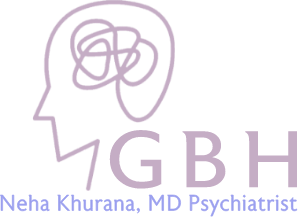
- April 30, 2024
Coping with Anxiety: Tips and Techniques to Help You Through
Anxiety is a natural human emotion we all experience from time to time. However, when anxiety becomes persistent, overwhelming, and interferes with daily life, it may signal an anxiety disorder. Whether you’re dealing with occasional worry or a diagnosed condition, there are strategies to help you manage anxiety and regain a sense of calmness.
Understanding Anxiety
Anxiety can manifest physically and emotionally. Here are some common symptoms:
- Physical: Rapid heartbeat, racing thoughts, restlessness, muscle tension, fatigue, difficulty sleeping.
- Emotional: Fear, worry, irritability, difficulty concentrating, a sense of impending doom.
One Conversation Can Change Everything! Consult Dr. Neha Khurana for
Tips for Coping with Anxiety in the Moment
When anxiety strikes, these techniques can provide immediate relief:
- Deep Breathing: Slow, controlled breaths signal to your body that it's safe to relax. Try the 4-7-8 breathing technique: breathe in for 4 counts, hold for 7, exhale for 8.
- Progressive Muscle Relaxation: Focus on tensing and relaxing different muscle groups throughout your body, releasing built-up tension.
- Grounding Techniques: Engage your senses to bring you back to the present. Try the "5-4-3-2-1" method: name 5 things you see, 4 you can touch, 3 you can hear, 2 you can smell, 1 you can taste.
- Mindful Movement: Go for a walk, do some gentle stretches, or mindful exercise like yoga to shift your focus and release physical tension.
Long-Term Anxiety Management Strategies
For lasting anxiety reduction, consider these practices:
- Lifestyle Changes: Prioritize sleep, regular exercise, and a balanced diet. Limit caffeine and alcohol, which can worsen anxiety.
- Challenge Negative Thinking: Our thoughts can fuel anxiety. Learn to identify and reframe unhelpful thinking patterns.
- Therapy: Cognitive Behavioral Therapy (CBT) is highly effective for anxiety disorders, giving you tools to manage symptoms and change thought patterns.
- Meditation: Mindfulness and meditation train your brain to focus on the present, reducing worry about the past or future.
- Medication: In some cases, medication may be recommended in conjunction with other treatment approaches.
One Conversation Can Change Everything! Consult Dr. Neha Khurana for
Georgia Behavioral Health: Finding the Support You Need
If anxiety is significantly impacting your life, reaching out to a mental health professional is crucial. At Georgia Behavioral Health, we understand the challenges of anxiety. We work with you to develop a personalized treatment plan that addresses the root of your anxiety and helps you find lasting relief.
Remember, you are not alone. With the right support and techniques, you can manage your anxiety, improve your well-being, and live a fulfilling life.
Please note: This blog is not a substitute for professional mental health care. If you are struggling with anxiety, don’t hesitate to seek help.
